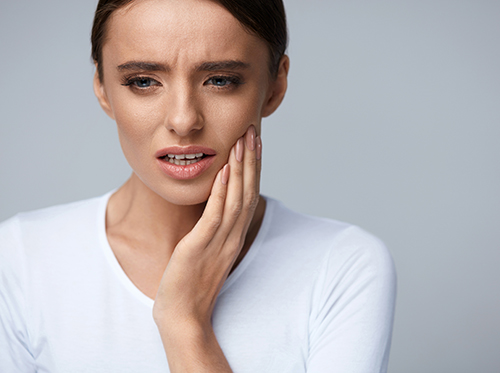How do I know if my gums are receding?
April 22nd, 2020

Gum recession, a common result of gum disease, occurs when the gum tissue that surrounds the teeth wears away or pulls back, forming pockets between the gumline and exposing more of the tooth. Gum recession occurs gradually, so you might not know that you have it. Left untreated, gum recession can result in tooth loss. In addition, there are several studies that suggest that gum disease is associated with modest increases in coronary heart disease. Here are five ways to know if your gums are receding.
1. Healthy gums are firm, light pink, and very elastic. If your gums don’t fit that description, then it’s time to visit our Fairview Heights, IL office. Red, swollen gums are a common symptom of gum disease, and may lead to gum recession.
2. Do your gums bleed easily when you brush or floss? If you have gum recession, even if you brush gently and with toothpaste specifically designed for sensitivity, it may still result in bleeding.
3. When you look in the mirror, do you see more of a tooth than you used to? This is one of the easiest ways to tell if you have gum recession. When gums recede, more of the tooth is visibly exposed. Look for lines or notches along the bottom of the teeth, as this typically indicates areas where the gums have receded.
4. One of the first signs of gum recession is tooth sensitivity. Does it hurt when you bite down or chew? The more gums recede, the more painful it is going to be. However, before you experience tooth sensitivity or pain, you may notice awkwardness when you bit down. When gum recession occurs, teeth can shift slightly, making it feel as if they are not properly aligned.
5. Loose teeth are a symptom of advanced gum recession and periodontal disease. In other words, the supporting bone structure of the teeth has already begun to deteriorate. If left untreated, it will result in tooth loss.
From deep cleaning (scaling) to gingival tissue grafting surgery, there are several ways to combat gum recession and periodontal disease. How gum recession is treated depends on how far advanced it is. Talk to Drs. Rottschalk, Acker, and Froidcoeur about what options are best for you.
What exactly is a cavity?
April 15th, 2020

We all know how discouraging can be it to hear you have a dental cavity. Knowing how cavities form can help you prevent them from popping up in your mouth. If you want to avoid a trip to see Drs. Rottschalk, Acker, and Froidcoeur, pay attention to the measures you can take to prevent bothersome cavities.
Did you know that cavities are properly a symptom of a disease called caries? When you have caries, the number of bad bacteria in your mouth increases, which causes an acceleration in tooth decay. Caries are caused by a pH imbalance in your mouth that creates problems with the biofilm on the teeth.
When there are long periods of low pH balance in the mouth, this creates a breeding ground for bacteria. When you get caries, this type of bacteria thrives in an acidic environment.
Depending on which foods and beverages you consume, the biofilm pH in your mouth will vary. The lower the pH number, the higher the acidity. When your intake contains mostly acidic foods that sit on your teeth, cavities begin to form. Water has a neutral pH, which makes it a good tool to promote a healthy pH balance in your mouth.
A healthy pH balance in your mouth will prevent cavities from forming over time. Mouth breathing and specific medications may also be factors that contribute to the development of caries when saliva flow decreases. Without saliva flow to act as a buffer against acid, bacteria has a higher chance of growing.
Don’t forget: Getting cavities isn’t only about eating too many sweets. It’s also about managing the pH levels in your mouth and preventing bad bacteria from growing on your teeth.
If you think you might have a cavity forming in your mouth, schedule an appointment at our Fairview Heights, IL office. It’s worthwhile to treat cavities early and avoid extensive procedures such as root canals from becoming necessary.
Keep up with brushing, flossing, and rinsing with mouthwash so you can prevent cavities over time.
What is gingivitis, and how can I treat it?
April 8th, 2020

Gingivitis is an early stage of gum disease that results when bacteria in your mouth cause inflammation in your gums. This is a common condition, and you can treat it effectively if you are aggressive. Otherwise, it could develop into more advanced gum disease, or periodontitis, and you could lose one or more teeth.
Watch for symptoms of gingivitis so you can ask Drs. Rottschalk, Acker, and Froidcoeur for help as soon as you need it. Strategies for treating gingivitis include thoroughly cleaning your teeth and assessing the scope of your gingivitis and how serious the problem is.
Gingivitis: Early Gum Disease
Your mouth contains many bacteria that form plaque, which is a sticky substance. You can get rid of plaque by brushing well, but if you don’t, it can build up on your teeth and form tartar. Bacteria can make your gums inflamed and cause pain and bleeding, or gingivitis. Other symptoms include loose teeth, bad breath, receding gums, and sensitive teeth. You’re at higher risk for gingivitis if you’re a smoker, if you have a weakened immune system, or if you have diabetes.
Assessment and Diagnosis
If you think you recognize the symptoms of gingivitis, contact our Fairview Heights, IL office to make an appointment. We will ask you about your risk factors for gingivitis and examine your teeth and mouth for signs of red and swollen gums. We may also measure the pockets around your teeth. If they are larger than usual, your gingivitis may be more advanced. Finally, will take some X-rays to get a picture of the bone structure of your jaw.
Deep Cleaning
You can’t get rid of the tartar on your teeth just by brushing at home. Instead, you need a deep cleaning consisting of scaling and root planing. Scaling involves scraping the plaque off of your teeth, both below and above the line of your gum. In root planing, the rough surfaces of your teeth where tartar is more likely to build up are smoothed. A laser may be used to make the procedure more effective, more accurate, and more comfortable.
Your Options for Sedation Dentistry
April 1st, 2020

Fear of going to the dentist is more common than you may think. That’s why Drs. Rottschalk, Acker, and Froidcoeur and our team want to make your visit as relaxing as possible.
Your anxiety about pain or routine procedures doesn’t have to stop you from visiting our Fairview Heights, IL office; we offer various types of sedation to remove the pain and stress from your dental procedure.
Nitrous Oxide Sedation
Nitrous oxide combined with local anesthetics ensures both pain relief and reduced anxiety for many patients. It’s useful because the dosage can be regulated during treatment, and patients are usually able to drive shortly after the procedure is completed.
Oral or Injected Sedation
With oral sedation, you may be given a pill or liquid to consume several hours before your treatment. Make sure someone will be available to drive you to your appointment, because you will not be able to drive yourself.
An oral liquid is often given to children before any shots or intravenous anesthesia. An intramuscular injection may be given at the office to provide relaxation benefits for 20 to 30 minutes.
Nitrous Oxide with an Oral Sedative
For patients with higher levels of anxiety, an oral or injected sedative can be offered before nitrous oxide begins. This can also be effective for reducing anxiety about the injection of local anesthetics itself. A liquid medication followed by nitrous oxide is beneficial for children to produce a deep sedation level.
General Anesthesia
This type of anesthesia can be offered as an inhaled gas or intravenous liquid. If no oral sedative is given before the general anesthesia is administered, you should wake up quickly after your procedure.
To reduce your anxiety, we can offer a pill or liquid medication before intravenous sedation starts. Intravenous sedation can also be used at moderate-to-deep sedation levels without complete loss of consciousness.
Drs. Rottschalk, Acker, and Froidcoeur and our team are happy to go over your sedation or pain prevention options when you visit. We’re here to ensure all your questions are answered and your procedure is a relaxing one.





